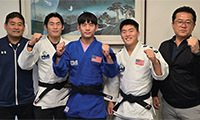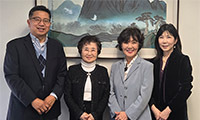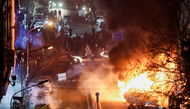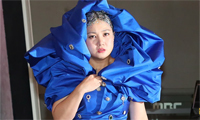▶ Who is Kim Dae-Jung?
▶ By Katherine Cowy
Over the past week, since South Korean President Kim Dae-jung was awarded the Nobel Peace Prize, I asked friends and strangers alike one question: Do you know who Kim Dae-jung is?
Most people had no idea who I was talking about—their only answer was a blank expression, a shake of the head, or eyes sauntering off in the distance.
“Kim who?” a colleague asked. “Does she work in the office?” The few who knew that Kim was a Korean leader could not confidently say whether he hailed from the North or the South.
My first encounter with Kim Dae-jung was five years ago, in a hospital in southern Seoul, as I was walking in to do an interview. He was walking out of the room of a young man who had been trapped in the rubble of a collapsed building. Amid white-capped nurses with clipboards and a frenzy of flowers, I brushed by him, a nondescript Korean man in a suit, stoic, his hair slicked back.
“Did you see him?” my translator hissed into my ear. “That’s Kim DaeJung!”
At the time, the name meant nothing to me. The incumbent president was a Kim, my boss was a Kim, I am a Kim. But as she explained the history of this particular Kim—opposition leader, political prisoner, fighter for democracy—I realized that he was a moral, even a noble, man, his life story is a contemporary Korean legend. Kim still walks with a limp, an injury received during a failed assassination attempt during his first run for the presidency in 1971.
Two years later, agents of the South Korean Central Intelligence Agency kidnapped him and took him out to sea to be drowned, but his life was spared at the last minute.
In 1980, he was arrested and sentenced to be hanged, but again the death sentence was interrupted. On hearing of the award, Kim asked that the glory be shared with fellow Koreans who had “sacrificed for and were dedicated to peace and democracy.”
Kim is still a controversial character, either passionately loved or reviled. Elders (generations in Korea are divided between those with memories of the war, and those without) are particularly split over Kim. Because he has dedicated over 40 years to reconciliation and cooperation between the two Koreas, Kim was often painted as a Communist sympathizer. Through Korea’s Cold-War eyes, it is an image hard to shake—harder even to accept.
But when news of the Nobel broke in Korea, fireworks sparkled and flowers were freely distributed. Happiness was the prevailing emotion, surpassing even traditional Korean pride. “I’m happy,” my mother gushed. “He’s the first Korean to win a Nobel.” I can imagine the pomp of the ceremony at the Kyobo Bookstore in downtown Seoul, where a large replica of the Nobel Prize has hung in a display case for years, waiting to be replaced by a photo of the nation’s first winner.
Over his dramatic career, Kim Dae-jung has been nominated for the award 14 times. The Nobel Committee did not include his partner-in-talks, North Korean President Kim Jong Il. This seemed a glaring slight (last year’s prize went to both sides in the Northern Ireland talks, 1994’s to the tripartite Middle East peace brokers), but the other Kim’s hermetic and unpredictable reputation--and shaky human rights record--disqualified him.
Kim’s presidency has been dedicated to his “Sunshine Policy” with the north. With the historical summit meeting in June and at least symbolic attempts at warmth that followed—family reunions, inter-Korean railway, Korean athletes marching under one flag in Sydney— his single-minded reunification vision remains steadfast.
It is impossible to know whether the Nobel Peace Prize will bring peace to Korea. It is clear that it will draw much more international attention to the on- going conflict (the two countries are still officially at war) and this can only help accelerate current moves toward one Korea.
Kim Dae-jung keeps on his desk a prized gift that he received upon his election to the presidency: a wristwatch from Nelson Mandela, one that the South African president wore during his years in prison. Indeed,there are so many similarities in the lives of the two men that those who know Kim calls him “the Nelson Mandela of Asia.”
I want Kim Dae-jung to be known not only by fellow Koreans or international policy chiefs, but by as many people as recognize Mandela. I hope he will be credited with Korea’s reunification, but that may not come to pass quickly.
I hope the Nobel will bring this man some recognition of his own, that his name will carry enough weight so that someday, another person may be the Kim Dae-jung of Latin America, or Africa, or Asia.
스마터리빙
more [ 건강]
[ 건강]이제 혈관 건강도 챙기자!
[현대해운]우리 눈에 보이지 않기 때문에 혈관 건강을 챙기는 것은 결코 쉽지 않은데요. 여러분은 혈관 건강을 유지하기 위해 어떤 노력을 하시나요?
 [ 건강]
[ 건강]내 몸이 건강해지는 과일궁합
 [ 라이프]
[ 라이프]벌레야 물럿거라! 천연 해충제 만들기
 [ 건강]
[ 건강]혈압 낮추는데 좋은 식품
[현대해운]혈관 건강은 주로 노화가 진행되면서 지켜야 할 문제라고 인식되어 왔습니다. 최근 생활 패턴과 식생활의 변화로 혈관의 노화 진행이 빨라지고
사람·사람들
more
[화제] 유도 미 국가대표 3형제… “LA 올림픽 금메달 위해 구슬땀”
3형제가 나란히 미국 국가대표로 활약하고 있어 화제다. 조슈아 양(22·-60kg급), 제이콥 양(20·-66kg급), 조나단 양(18·-60…

연세대 남가주 동문회… “61주년 맞아 새로운 도약”
연세대학교 남가주 동문회 제50대 회장으로 취임한 권기숙 회장이 신임 회장단과 함께 본보를 방문해 향후 동문회 운영 방향과 비전을 밝혔다. 1…
LA 북부한인회, 글렌데일 시청서 ‘한인의 날’
LA 북부한인회(회장 박승목)는 미주 한인 이민 123주년 기념 ‘미주 한인의 날’을 맞아 지난 13일 글렌데일 시청에서 열린 한인의 날 선포…
‘전통 실크등의 아름다움’
LA 한국문화원이 경상남도 진주시와 함께 ‘한국의 빛: 진주 실크등 전시회’를 1월15일부터 2월28일까지 개최한다고 밝혔다. 이번 전시는 문…
코윈 퍼시픽 LA 신년회·이사장 취임식
세계한민족여성네트워크(KOWIN) 퍼시픽 LA 지부(회장 조미순)는 지난 7일 LA 용수산에서 신년회 및 이사장 취임식을 개최했다. 참석자들은…
많이 본 기사
- 트럼프, 새 건강보험 개혁안 발표… … 1
- 美가 외면한 마차도, 베네수 운명 쥔 트럼프 면담… “대화 잘돼”
- ‘尹 내란 첫 결론’ 체포방해 오늘 1심 선고…TV 생중계
- 美-대만, 상호관세 15% 무역합의… 상무 “5천억달러 투자 유치”
- NBA 이어 대학농구서도 경기조작… “더 큰 점수차로 져라”
- 백악관 “이란서 800건 처형 중단돼…살해 계속시 심각한 결과”
- 2026 밀라노·코르티나담페초 동계올림픽 스키 종목
- 트럼프, 반발시위 거세지는 미네소타에 “내란법 발동할 수 있어”
- 뉴욕증시, 반도체는 좋은데 고점은 부담…상승 마감
- 오픈AI, ‘올트먼 설립’ 뇌기술 업체 투자…이해충돌 논란 일듯
- 사기 피해 방지하려면… 시도 때도 없이 걸려오는 스팸 전화·문자 ‘심각’
- 베네수 임시 대통령, 석유 분야 외국투자 촉진 개혁 예고
- “트럼프 야욕 안꺾여”…덴마크·유럽 주요국, 그린란드에 파병
- 스포티파이, 미국 등서 요금 인상…월 12.99달러
- 넷플릭스, 소니 영화 독점 스트리밍 계약… “70억달러이상 추정”
- 박나래 ‘전 남친’ 정체, 직접 밝혔… 1
- 美자산운용사 블랙록, 운용자산 14조 달러 돌파…ETF가 성장주도
- ‘40세’ 강은비, 임신 21주만 유산 “조기 양막 파열..子 보냈다”
- ‘워너-넷플릭스 계약정보 즉각 공개’ 파라마운트 청구 기각
- 주택가 공놀이에 벌금·징역까지? 1
- 美, ‘반정부 시위 탄압’ 이란 당국자 제재…對이란 압박 높여
- 美, 멕시코서 미군 참여 마약단속 원해…셰인바움 정부 압박
- 10억 vs 3000만 원..박나래·전 매니저, 합의서 공개 ‘입장차 극명’
- 경찰, 김병기 ‘사라진 금고’ 추적…… 1
- 트럼프, 브라질·소말리아 등 75개국 이민비자 발급 중단
- ‘환율·반미정서·고비용’ 미국 관광산업 ‘된서리’
- 건강문제 첫 조기귀환…ISS 우주비행사 4명 지구 안착
- 美남부사령관후보자 “중러의 서반구 병력배치·본토위협 막을것”
- 국적이탈 수속에 2년이나 걸리다니⋯ 2
- 무서운 ‘독감’… 한인 5세 아동 사망
- 운전면허증 발급시 유권자 자동등록
- 독일, 그린란드에 병력 보내며 “중러… 1
- 붉은 고기, 얼마나 먹어야 안전할까?… 전문가들 조언은
- 프랑스 마크롱, 이란·그린란드 사태에 긴급 국방회의
- 방탄소년단 월드투어, 외신도 집중.. “새로운 기준 제시할 것”
- 이혜훈 “청약 논란, 조사 결과 따를 것”…자녀 의혹엔 답변 피해
- ‘12살 연하♥’ 신정환, 가석방 3년 만에 결혼.. “혼전임신이었다” 고백
- 김경·강선우·前보좌관, 전부 진술 엇갈려…3자 진실공방 양상
- 올 중간선거 연방의회 ‘대물갈이’ 예고
- 모기지 금리 인하와 주택 시장의 변곡… 1
- 송성문 어떻게든 MLB 뛰게 한다 “3루·2루·1루에 심지어 외야까지 시도” 감독 확언
- 라과디아 예술고교 9학년 김나린양 MTNA 주니어 우드윈드 부문 동부 디비전 우승
- NYPD, 플러싱 전기스쿠터 날치기 수배
- 뉴욕한인회‘제123주년 미주한인의 날’ 기념식 성황
- 트럼프, ‘피난처’ 지자체에 “연방 … 1
- LA “단속 요원 오지마” ‘ICE … 2
- 오바마케어 가입자 급감…보조확대 종료 탓?
- ‘장동건♥’ 고소영, 노안 고백 “돋… 1
- 선 넘은 스타벅스 직원 경찰에 ‘돼지… 1
- [여명] 망국병 ‘진영 논리’ 1
1/5지식톡

-
 한국 안경을 무료 배송으로 받아보실…
0
한국 안경을 무료 배송으로 받아보실…
0안녕하세요. 서울 안암동에 위치한 ‘보고싶다 안경원’입니다.저희는 다년간 한국 고객분들께 착용감 좋은 안경테와 한국안경브랜드,고압축 도수 렌즈를 합리적인 가격에 제공해온 안경 전문점입니다.이번에 해외 배송이 가능해…
-
 미 육군 사관학교 West Poin…
0
미 육군 사관학교 West Poin…
0https://youtu.be/SxD8cEhNV6Q연락처:wpkapca@gmail.comJohn Choi: 714-716-6414West Point 합격증을 받으셨나요?미 육군사관학교 West Point 학부모 모…
-
 ☝️해외에서도 가능한 한국어 선생님…
0
☝️해외에서도 가능한 한국어 선생님…
0이 영상 하나면 충분합니다!♥️상담신청문의♥️☝️ 문의 폭주로 '선착순 상담'만 진행합니다.☎️ : 02-6213-9094✨카카오톡ID : @GOODEDU77 (@골뱅이 꼭 붙여주셔야합니다…
-
 테슬라 자동차 시트커버 장착
0
테슬라 자동차 시트커버 장착
0테슬라 시트커버, 사놓고 아직 못 씌우셨죠?장착이 생각보다 쉽지 않습니다.20년 경력 전문가에게 맡기세요 — 깔끔하고 딱 맞게 장착해드립니다!장착비용:앞좌석: $40뒷좌석: $60앞·뒷좌석 …
-
 식당용 부탄가스
0
식당용 부탄가스
0식당용 부탄가스 홀세일 합니다 로스앤젤레스 다운타운 픽업 가능 안녕 하세요?강아지 & 고양이 모든 애완동물 / 반려동물 식품 & 모든 애완동물/반려동물 관련 제품들 전문적으로 홀세일/취급하는 회사 입니다 100% …
케이타운 1번가
오피니언
 한 영 재미수필가협회 회장
한 영 재미수필가협회 회장 [한영의 독서칼럼] 햇살을 향해 헤엄치기
 이규민 한식진흥원 이사장
이규민 한식진흥원 이사장 [로터리] 시간을 담그는 문화, 한국의 장
 이상훈 서울경제 정치부장
이상훈 서울경제 정치부장 [여명] 망국병 ‘진영 논리’
 허경옥 수필가
허경옥 수필가 [윌셔에서] 숲의 숨으로
 이영태 / 한국일보 논설위원
이영태 / 한국일보 논설위원 [지평선] 조롱받는 72만 ‘쉬었음 청년’

[왈가 왈부] 김경·강선우 뒷북 출금… ‘수사 뭉개기’ 의심 살 만하네요
 정숙희 논설위원
정숙희 논설위원새로 나온 이상한 식품 피라미드
 데이빗 이그나티우스 워싱턴포스트 칼럼니스트
데이빗 이그나티우스 워싱턴포스트 칼럼니스트 [데이빗 이그나티우스 칼럼] 그린란드에 대한 트럼프의 위험한 집착
 김동찬 시민참여센터 대표
김동찬 시민참여센터 대표 [미국은 지금] 침팬지의 그루밍과 인간의 민주주의
1/3지사별 뉴스

뉴욕한인회‘제123주년 미주한인의 날’ 기념식 성황
뉴욕한인회(회장 이명석)가 13일 맨하탄 뉴욕한인회관에서 개최한‘제123주년 미주한인의 날’ 기념 행사가 각계에서 활동 중인 1.5세 및 2세…
국적이탈 수속에 2년이나 걸리다니⋯

연방의회서 “한인 위상·한미동맹 제고” 한목소리
한인 이민자들이 미국에 도착한 123주년을 기념하고 한인들의 미국 사회에의 기여를 알리는 ‘제 21회 미주 한인의 날’ 행사가 13일 연방의회…
한국학교 방향성 재정립 모색

트럼프 “美시민에 사기친 귀화 이민자, 국적 불문 시민권 박탈”
도널드 트럼프 대통령은 13일 “소말리아든 어디 출신이든, 귀화 이민자 중 우리 시민들을 상대로 사기를 쳐 유죄 판결을 받으면 시민권을 박탈할…
SF 기독대학교 ‘성장 발전’ 기대



















































.png)


댓글 안에 당신의 성숙함도 담아 주세요.
'오늘의 한마디'는 기사에 대하여 자신의 생각을 말하고 남의 생각을 들으며 서로 다양한 의견을 나누는 공간입니다. 그러나 간혹 불건전한 내용을 올리시는 분들이 계셔서 건전한 인터넷문화 정착을 위해 아래와 같은 운영원칙을 적용합니다.
자체 모니터링을 통해 아래에 해당하는 내용이 포함된 댓글이 발견되면 예고없이 삭제 조치를 하겠습니다.
불건전한 댓글을 올리거나, 이름에 비속어 및 상대방의 불쾌감을 주는 단어를 사용, 유명인 또는 특정 일반인을 사칭하는 경우 이용에 대한 차단 제재를 받을 수 있습니다. 차단될 경우, 일주일간 댓글을 달수 없게 됩니다.
명예훼손, 개인정보 유출, 욕설 등 법률에 위반되는 댓글은 관계 법령에 의거 민형사상 처벌을 받을 수 있으니 이용에 주의를 부탁드립니다.
Close
x